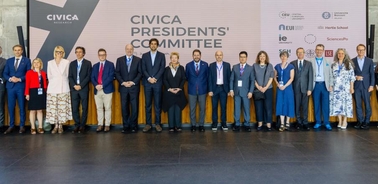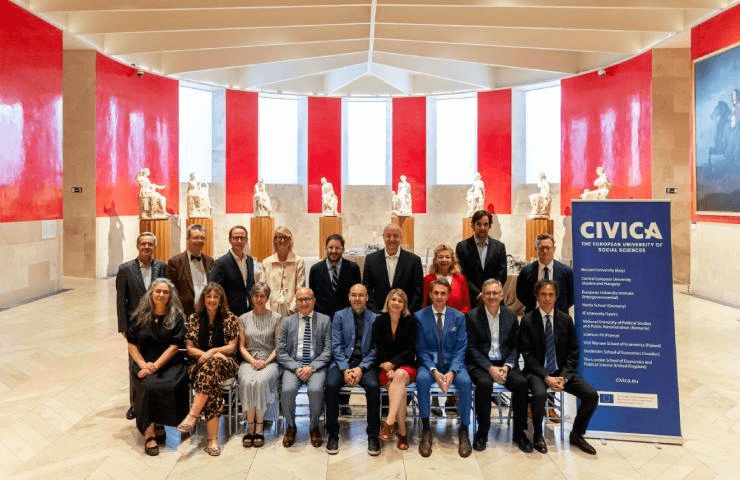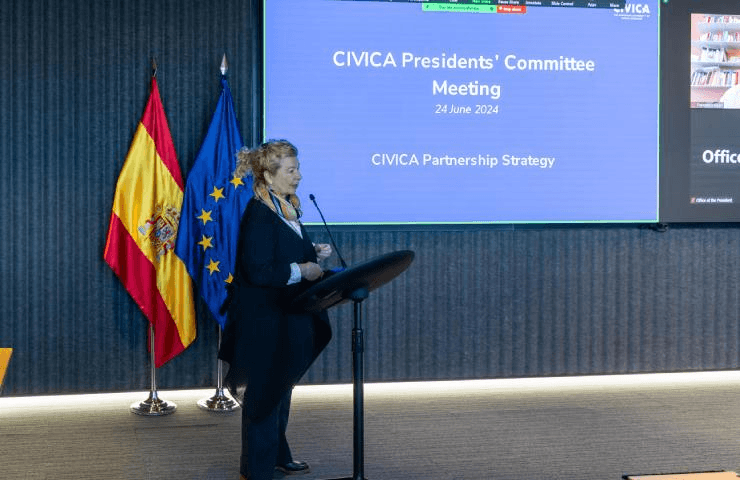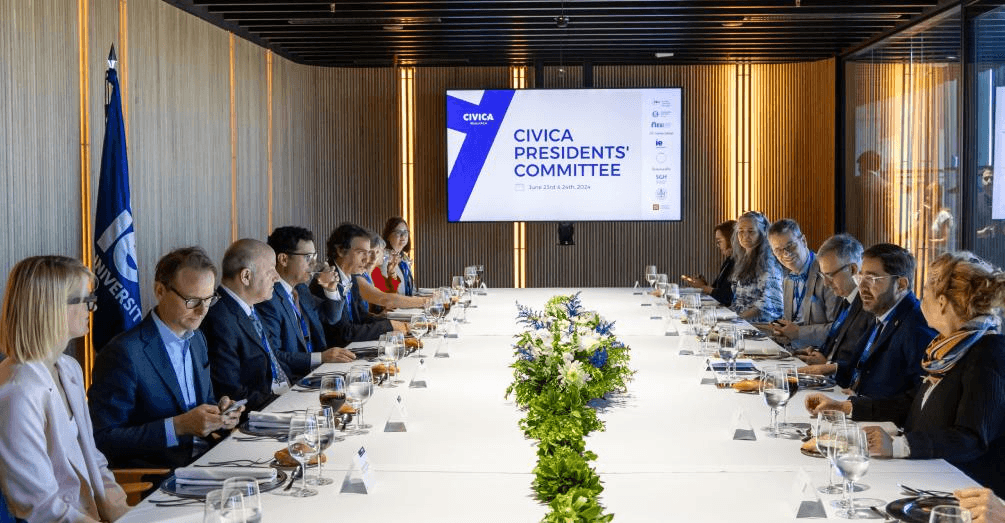IE University hosts annual CIVICA Presidents' Committee Meeting to propel innovation and excellence in European higher education

This week, IE University hosted the 2024 CIVICA Presidents' Committee Meeting in Madrid, a pivotal event for the Alliance, where the future of CIVICA and the advancement of strategic priorities were discussed. Key focus areas included research and innovation, long-term sustainability of the Alliance, as well as the global partnership strategy moving forward.
The annual event was attended by presidents and rectors from most of the CIVICA partner universities, including IE University, Bocconi University, Central European University, European University Institute, SNSPA, Stockholm School of Economics, Sciences Po, SGH – Warsaw School of Economics, and The London School of Economics and Political Science (LSE). The gathering served to foster stronger collaborations and share best practices, significantly enhancing the collective impact within the European Universities initiative.
The meeting began on Sunday, June 23, with a private visit to the Prado Museum led by Professor Anna Wieck from IE School of Humanities, who guided attendees through the museum's most relevant masterpieces. On Monday, Manuel Muñiz, Provost of IE University and Dean of IE School of Politics, Economics and Global Affairs, opened the meeting at the IE Tower, the technological and sustainable campus of IE University in Madrid. Muñiz highlighted the significance of CIVICA for higher education in Europe and underscored the need to continue expanding and fostering collaboration in teaching, research, and student experience.
During this event, participants discussed the future of the Alliance, the impact of geopolitics in higher education and how innovation and emerging technologies, particularly artificial intelligence, are affecting what universities do and the value that they bring to students and society at large.
"We have much ahead to navigate together, and indeed, this meeting has been an excellent opportunity to address the challenges we face as an alliance of European universities. From research to teaching to outreach."
Manuel Muñiz, Provost of IE University and Dean of IE School of Politics, Economics and Global Affairs
CIVICA leadership focused the event’s discussions on the following strategic priorities: supporting research and fostering innovation, building the long-term sustainability of the Alliance by developing strategies to ensure enduring success and impact. They also addressed the partnership strategy and the global positioning of the Alliance through the strengthening of engagement with global socio-economic actors and academic partners, such as the CIVICA for Ukraine.
"Great strides have been taken at this year’s Presidents’ Committee Meeting, particularly regarding the future of CIVICA."
Maria Eugenia Marín, Vice Provost of Global Academic Partnerships and Alliances at IE University
"Plans for a comprehensive research strategy and an ambitious CIVICA global partnership strategy were discussed at length and pave the way for a global positioning of the alliance," Marín added at the end of the meeting.
Notable attendees included rectors, presidents and vice-presidents such as Francesco Billari from Bocconi (online), Patrizia Nanz from the European University Institute (online), Remus Precopie from SNSPA Bucharest, Sergei Guriev, Provost Sciences Po, Piotr Wachowiak from SGH Warsaw School of Economics, Lars Strannegård from the Stockholm School of Economics, and Larry Kramer from The London School of Economics.
The Alliance was also represented by members of the CIVICA Steering Committee and the Managing Team such as Executive Director Aurelien Krejbich, Catherine De Vries from Bocconi University, Carsten Schneider from Central European University, Sebastian Huber from the European University Institute, and Jeremy Perelman from Sciences Po.
Jeremy Perelman, Vice-President for International at Sciences Po and CIVICA Coordinator, highlighted the outcomes of the annual meeting, stating, "CIVICA continues to expand its activities in education and research, with an increase in the number of students and faculty involved. The dynamics at play are very positive, fostering a collaborative spirit to build CIVICA's dimension beyond Europe and create the conditions for a sustainable alliance with the support of Erasmus+.”
"The alliance becomes more relevant each day, and as coordinator, we are fully committed to positioning CIVICA as a leading European university alliance in the social sciences."
Jeremy Perelman, Vice-President for International at Sciences Po and CIVICA Coordinator
With a robust community of 72,000 students and 13,000 faculty members, CIVICA stands at the forefront of higher and postgraduate education in the social sciences. This dynamic alliance of ten premier European institutions aims to establish an inter-university campus dedicated to collaborative teaching, cutting-edge research, and innovative learning.
About CIVICA
CIVICA - The European University of Social Sciences brings together ten leading European higher education institutions in the social sciences. CIVICA aims to build an inter-university campus that provides joint and long-lasting opportunities in teaching, research and innovative learning, while enhancing academic excellence and facilitating civic engagement in Europe and beyond. CIVICA was selected by the European Commission as one of the pilot European Universities in 2019 and confirmed as successful alliance in 2022 for its full roll-out under the Erasmus+ programme. Read more on civica.eu.


